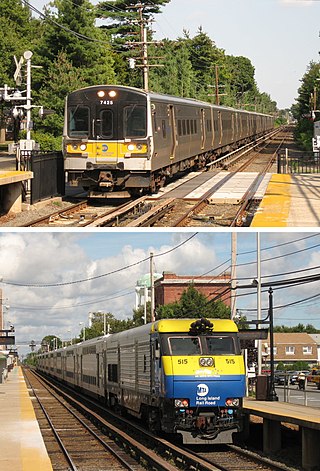
The Long Island Rail Road, often abbreviated as the LIRR and verbalized "L-I-Double-R", is a railroad in the southeastern part of the U.S. state of New York, stretching from Manhattan to the eastern tip of Suffolk County on Long Island. The railroad currently operates a public commuter rail service, with its freight operations contracted to the New York and Atlantic Railway. With an average weekday ridership of 354,800 passengers in 2016, it is the busiest commuter railroad in North America. It is also one of the world's few commuter systems that runs 24/7 year-round. It is publicly owned by the Metropolitan Transportation Authority, which refers to it as MTA Long Island Rail Road. In 2023, the system had a ridership of 75,186,900, or about 276,800 per weekday as of the first quarter of 2024.

Pennsylvania Station is the main intercity railroad station in New York City and the busiest transportation facility in the Western Hemisphere, serving more than 600,000 passengers per weekday as of 2019. The station is located beneath Madison Square Garden in the block bounded by Seventh and Eighth Avenues and 31st and 33rd Streets and in the James A. Farley Building, with additional exits to nearby streets, in Midtown Manhattan. It is close to several popular Manhattan locations, including Herald Square, the Empire State Building, Koreatown, and Macy's Herald Square.

Metro-North Railroad, trading as MTA Metro-North Railroad, is a suburban commuter rail service operated by the Metropolitan Transportation Authority (MTA), a public authority of the U.S. state of New York. Metro-North serves the New York Metropolitan Area, running service between New York City and its northern suburbs in New York and Connecticut, including Port Jervis, Spring Valley, Poughkeepsie, Yonkers, New Rochelle, Mount Vernon, White Plains, Southeast and Wassaic in New York and Stamford, New Canaan, Danbury, Bridgeport, Waterbury, and New Haven in Connecticut. Service in Connecticut is operated under contract with the Connecticut Department of Transportation. Metro-North also provides local rail service within the New York City boroughs of Manhattan and the Bronx.

Harlem–125th Street station is a commuter rail stop serving the Metro-North Railroad's Hudson, Harlem, and New Haven Lines. It is located at East 125th Street and Park Avenue in East Harlem, Manhattan, New York City. The station also serves as an important transfer point between the Metro-North trains and the New York City Subway's IRT Lexington Avenue Line for access to the Upper East Side of Manhattan. It is the only station besides Grand Central Terminal that serves all three lines east of the Hudson River. Trains leave for Grand Central Terminal, as well as to the Bronx and the northern suburbs, regularly.
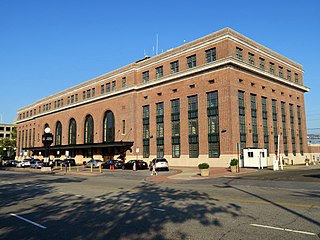
New Haven Union Station is the main railroad passenger station in New Haven, Connecticut. It is the third such station in the city of New Haven, preceded by both an 1848 built station in a different location, and an 1879 built station near the current station's location. Designed by noted American architect Cass Gilbert, the present beaux-arts Union Station was completed and opened in 1920 after the previous Union Station was destroyed by fire. It served the New York, New Haven and Hartford Railroad for the next five decades, but fell into decline following World War II along with the United States railroad industry as a whole.

Fordham station, also known as Fordham–East 190th Street station, is a commuter rail stop on the Metro-North Railroad's Harlem and New Haven Lines, serving Fordham Plaza in the Fordham neighborhood of the Bronx, New York City. The platforms are situated just below street level and feature two expanded side platforms that serve eight cars each, on the outer tracks. The station building sits above the tracks on the Fordham Road overpass, and still bears the name New York Central Railroad on its facade. The station is among the busiest rail stations in the Bronx.
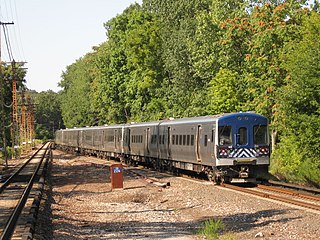
The Harlem Line is an 82-mile (132 km) commuter rail line owned and operated by the Metro-North Railroad in the U.S. state of New York. It runs north from New York City to Wassaic, in eastern Dutchess County. The lower 53 miles (85 km) from Grand Central Terminal to Southeast, in Putnam County, is electrified with a third rail and has at least two tracks. The section north of Southeast is a non-electrified single-track line served by diesel locomotives. Before the renaming of the line in 1983, it eventually became the Harlem Division of the New York Central Railroad. The diesel trains usually run as a shuttle on the northern end of the line, except for rush-hour express trains in the peak direction.
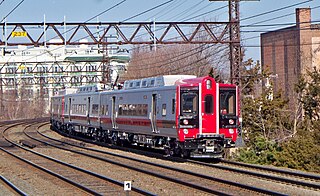
The New Haven Line is a 72.7 mi (117.0 km) commuter rail line operated by the Metro-North Railroad in the U.S. states of New York and Connecticut. Running from New Haven, Connecticut, to New York City, the New Haven Line joins the Harlem Line in Mount Vernon, New York, and continues south to Grand Central Terminal in Manhattan. The New Haven Line carries 125,000 passengers every weekday and 39 million passengers a year. The busiest intermediate station is Stamford, with 8.4 million passengers, or 21% of the line's ridership.

The Hudson Line is a commuter rail line owned and operated by the Metro-North Railroad in the U.S. state of New York. It runs north from New York City along the east shore of the Hudson River, terminating at Poughkeepsie. The line was originally the Hudson River Railroad, and eventually became the Hudson Division of the New York Central Railroad. It runs along what was the far southern leg of the Central's famed "Water Level Route" to Chicago.

Van Nest is a working-class neighborhood geographically located in the East Bronx section of the Bronx, New York City. Going clockwise, its boundaries are Bronxdale Avenue to the northeast, the Amtrak tracks to the southeast, and Bronx Park to the west. Van Nest predated Morris Park by 20 years and is considered the older of the two communities. Morris Park Avenue and White Plains Road are the primary commercial thoroughfares through Van Nest.

Williams Bridge station is a commuter rail stop on the Metro-North Railroad's Harlem Line, serving the Williamsbridge and Norwood sections of the Bronx, New York City. The station is located at the intersection of Gun Hill Road and Webster Avenue. The station has two offset high-level side platforms, each four cars long, serving the outer tracks of the four-track line.

Woodlawn station is a commuter rail stop on the Metro-North Railroad's Harlem Line, serving the Woodlawn section of the Bronx, New York City. It is located on East 233rd Street near Webster Avenue. Just north of the station is Woodlawn Junction, where the New Haven Line splits from the Harlem Line to join the Northeast Corridor.

Port Chester station is a commuter rail station on the Metro-North Railroad New Haven Line, located in Port Chester, New York. The station is the northernmost station on the line in New York before crossing into Connecticut. The station has two high-level side platforms, each 10 cars long, serving the outer tracks of the four-track Northeast Corridor.

Yankees–East 153rd Street station is a commuter rail stop on the Metro-North Railroad's Hudson Line, serving Yankee Stadium and the Concourse neighborhood in the Bronx, New York City. It opened on May 23, 2009, and provides daily local service on the Hudson Line.
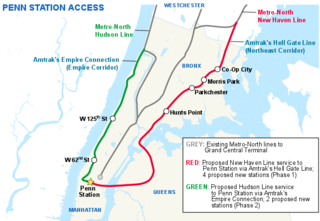
Penn Station Access (PSA) is a public works project underway by the Metropolitan Transportation Authority in New York City. The goal of the project is to allow Metro-North Railroad commuter trains to access Penn Station on Manhattan's West Side, using existing trackage owned by Amtrak. Metro-North trains currently terminate exclusively at Grand Central in Midtown Manhattan.

The Hell Gate Line is the portion of Amtrak's high-speed Northeast Corridor between Harold Interlocking in Sunnyside, Queens, and Shell Interlocking in New Rochelle, New York, within the New York metropolitan area.

Grand Central Madison is a commuter rail terminal for the Long Island Rail Road (LIRR) in the Midtown East neighborhood of Manhattan in New York City. Part of the East Side Access project, the new terminal started construction in 2008 and opened on January 25, 2023. The station sits beneath Grand Central Terminal, which serves the Metropolitan Transportation Authority (MTA)'s Metro-North Railroad.
Co-op City station is a planned passenger rail station on the Metro-North Railroad's New Haven Line, to be located in the Co-op City neighborhood of the Bronx in New York City. The station is planned to open in 2027 as part of the Penn Station Access project. The station will be located under Interstate 95 along the southern edge of Co-op City, with two entrances on the north side of the tracks.
Morris Park station is a planned passenger rail station on the Metro-North Railroad's New Haven Line, to be located in the Morris Park neighborhood of the Bronx in New York City. The station is planned to open in 2027 as part of the Penn Station Access project. It will be located at Morris Park Avenue adjacent to the Albert Einstein College of Medicine, with entrances from both sides of the tracks. Groundbreaking took place in December 2022.

Hunts Point station is a planned passenger rail station on Metro-North Railroad's New Haven Line, to be located in the Hunts Point neighborhood of the Bronx in New York City. The station is planned to open in 2027 as part of the Penn Station Access project, which will add four stations in the Bronx. The station will be located north of Hunts Point Avenue, behind the former New York, New Haven and Hartford Railroad station, which was designed by Cass Gilbert.




















